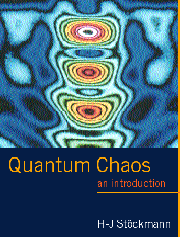5 - Eigenvalue dynamics
Published online by Cambridge University Press: 19 October 2009
Summary
In many spectroscopic experiments the energy levels of a system are determined as a function of an external parameter. Take as an example a hydrogen atom in a magnetic field. As long as the magnetic interaction is small compared to the spacing between neighbouring levels, a level with angular momentum quantum number L splits equidistantly into its 2L + 1 magnetic sublevels. A qualitatively different behaviour is found if the magnetic Zeeman interaction is of the same order of magnitude as the mean level spacing. In this range any regularity in the magnetic splitting is lost, and the energy levels move erratically as a function of the magnetic field. In billiard systems a shape parameter such as one length may take the role of the magnetic field. In chaotic systems degeneracies no longer occur, apart from accidental ones having the measure zero. Consequently crossings of eigenvalues are never observed when the parameter is changed, and they are converted into anti-crossings. For two-level systems this is an effect well-known in elementary quantum mechanics. The resulting motion of the eigenvalues dependent on the external parameter strongly resembles the dynamics of the particles of a one-dimensional gas with repulsive interaction.
The dynamical concept was introduced by Pechukas [Pec83] and further developed by Yukawa [Yuk85], and is therefore called the Pechukas–Yukawa model in the following. The major part of this chapter will treat the consequences of this model.
Information
- Type
- Chapter
- Information
- Quantum ChaosAn Introduction, pp. 183 - 209Publisher: Cambridge University PressPrint publication year: 1999
